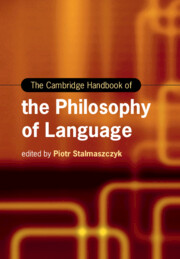Book contents
- The Cambridge Handbook of the Philosophy of Language
- Cambridge Handbooks in Language and Linguistics
- The Cambridge Handbook of the Philosophy of Language
- Copyright page
- Contents
- Figures
- Tables
- Contributors
- Preface
- 1 Philosophy of Language: Definitions, Disciplines, and Approaches
- Part I The Past, Present, and Future of Philosophy of Language
- Part II Some Foundational Issues
- Part III From Truth to Vagueness
- Part IV Issues in Semantics and Pragmatics
- Part V Philosophical Implications and Linguistic Theories
- 26 Philosophical Implications of Generative Grammar
- 27 Conceptual Semantics and Its Implications for Philosophy of Language
- 28 Relevance Theory and the Philosophy of Language
- 29 Mental Files
- 30 Contemporary Discourse Studies and Philosophy of Language
- Part VI Some Extensions
- References
- Index
28 - Relevance Theory and the Philosophy of Language
from Part V - Philosophical Implications and Linguistic Theories
Published online by Cambridge University Press: 12 November 2021
- The Cambridge Handbook of the Philosophy of Language
- Cambridge Handbooks in Language and Linguistics
- The Cambridge Handbook of the Philosophy of Language
- Copyright page
- Contents
- Figures
- Tables
- Contributors
- Preface
- 1 Philosophy of Language: Definitions, Disciplines, and Approaches
- Part I The Past, Present, and Future of Philosophy of Language
- Part II Some Foundational Issues
- Part III From Truth to Vagueness
- Part IV Issues in Semantics and Pragmatics
- Part V Philosophical Implications and Linguistic Theories
- 26 Philosophical Implications of Generative Grammar
- 27 Conceptual Semantics and Its Implications for Philosophy of Language
- 28 Relevance Theory and the Philosophy of Language
- 29 Mental Files
- 30 Contemporary Discourse Studies and Philosophy of Language
- Part VI Some Extensions
- References
- Index
Summary
Relevance Theory (RT) takes a cognitive-scientific approach to the study of human communication and utterance comprehension, but its roots lie in Grice’s philosophical analysis of speaker’s meaning and his account of “the logic of conversation.” The debt of RT (and of other current pragmatic theories) to Grice’s groundbreaking ideas cannot be overestimated. Work within RT pragmatics has also interacted with, influenced and been influenced by, much other work within the philosophy of language, in particular the multiple issues and concerns that have arisen in debates between advocates of minimalist and of contextualist accounts of truth-conditional semantics. Among the many issues that could be discussed here, I will focus on three in particular: (a) the proper domain of a pragmatic theory; (b) the role of pragmatics in grasping what a speaker explicitly communicates; (c) the priority of word sense conventions or of pragmatics in explaining linguistic communication.
- Type
- Chapter
- Information
- The Cambridge Handbook of the Philosophy of Language , pp. 515 - 534Publisher: Cambridge University PressPrint publication year: 2021



